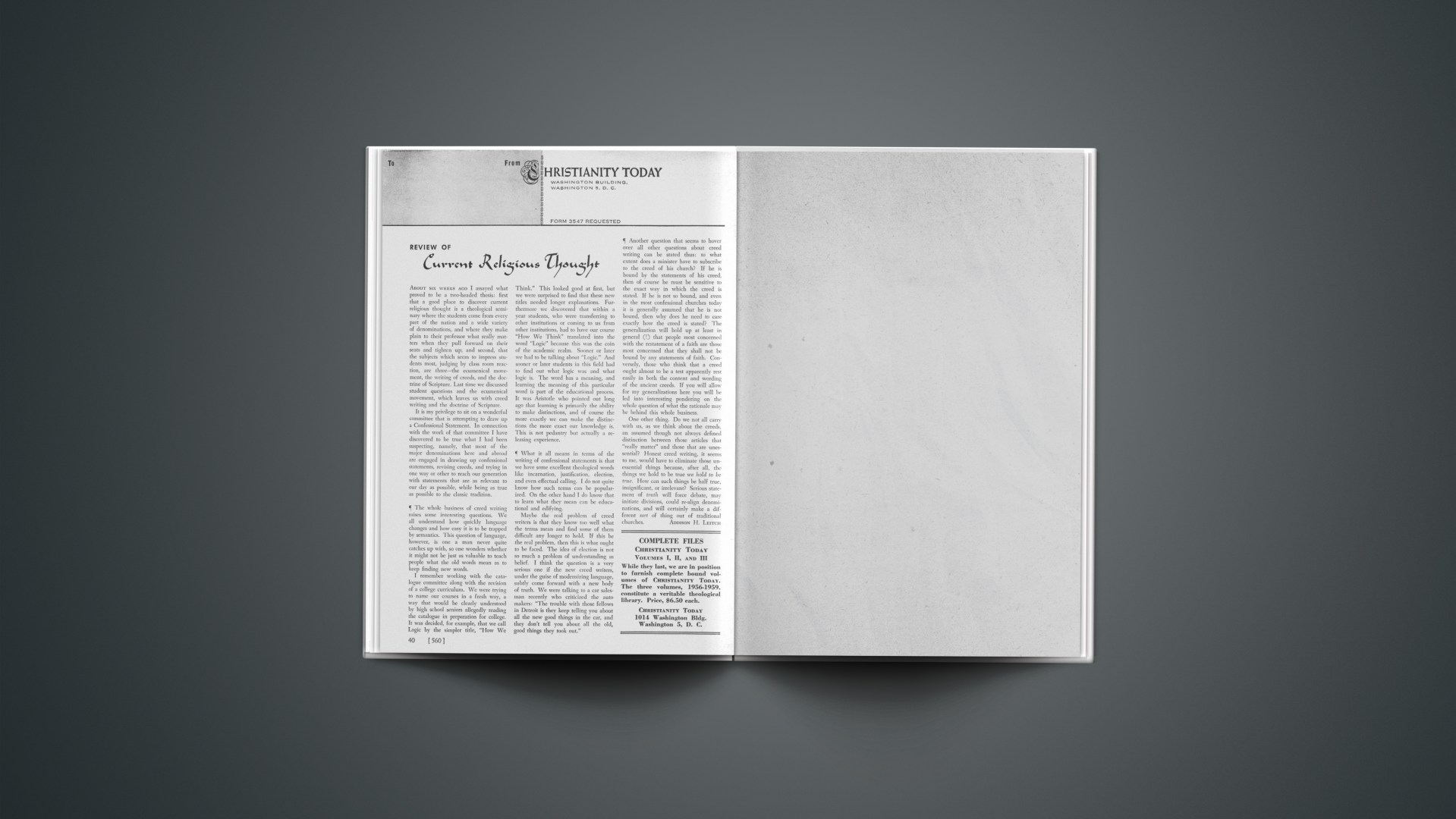About six weeks ago I assayed what proved to be a two-headed thesis: first that a good place to discover current religious thought is a theological seminary where the students come from every part of the nation and a wide variety of denominations, and where they make plain to their professor what really matters when they pull forward on their seats and tighten up; and second, that the subjects which seem to impress students most, judging by class room reaction, are three—the ecumenical movement, the writing of creeds, and the doctrine of Scripture. Last time we discussed student questions and the ecumenical movement, which leaves us with creed writing and the doctrine of Scripture.
It is my privilege to sit on a wonderful committee that is attempting to draw up a Confessional Statement. In connection with the work of that committee I have discovered to be true what I had been suspecting, namely, that most of the major denominations here and abroad are engaged in drawing up confessional statements, revising creeds, and trying in one way or other to reach our generation with statements that are as relevant to our day as possible, while being as true as possible to the classic tradition.
The whole business of creed writing raises some interesting questions. We all understand how quickly language changes and how easy it is to be trapped by semantics. This question of language, however, is one a man never quite catches up with, so one wonders whether it might not be just as valuable to teach people what the old words mean as to keep finding new words.
I remember working with the catalogue committee along with the revision of a college curriculum. We were trying to name our courses in a fresh way, a way that would be clearly understood by high school seniors allegedly reading the catalogue in preparation for college. It was decided, for example, that we call Logic by the simpler title, “How We Think.” This looked good at first, but we were surprised to find that these new titles needed longer explanations. Furthermore we discovered that within a year students, who were transferring to other institutions or coming to us from other institutions, had to have our course “How We Think” translated into the word “Logic” because this was the coin of the academic realm. Sooner or later we had to be talking about “Logic.” And sooner or later students in this field had to find out what logic was and what logic is. The word has a meaning, and learning the meaning of this particular word is part of the educational process. It was Aristotle who pointed out long ago that learning is primarily the ability to make distinctions, and of course the more exactly we can make the distinctions the more exact our knowledge is. This is not pedantry but actually a releasing experience.
What it all means in terms of the writing of confessional statements is that we have some excellent theological words like incarnation, justification, election, and even effectual calling. I do not quite know how such terms can be popularized. On the other hand I do know that to learn what they mean can be educational and edifying.
Maybe the real problem of creed writers is that they know too well what the terms mean and find some of them difficult any longer to hold. If this be the real problem, then this is what ought to be faced. The idea of election is not so much a problem of understanding as belief. I think the question is a very serious one if the new creed writers, under the guise of modernizing language, subtly come forward with a new body of truth. We were talking to a car salesman recently who criticized the auto makers: “The trouble with those fellows in Detroit is they keep telling you about all the new good things in the car, and they don’t tell you about all the old, good things they took out.”
Another question that seems to hover over all other questions about creed writing can be stated thus: to what extent does a minister have to subscribe to the creed of his church? If he is bound by the statements of his creed, then of course he must be sensitive to the exact way in which the creed is stated. If he is not so bound, and even in the most confessional churches today it is generally assumed that he is not bound, then why does he need to care exactly how the creed is stated? The generalization will hold up at least in general (!) that people most concerned with the restatement of a faith are those most concerned that they shall not be bound by any statements of faith. Conversely, those who think that a creed ought almost to be a test apparently rest easily in both the content and wording of the ancient creeds. If you will allow for my generalizations here you will be led into interesting pondering on the whole question of what the rationale may be behind this whole business.
One other thing. Do we not all carry with us, as we think about the creeds, an assumed though not always defined distinction between those articles that “really matter” and those that are unessential? Honest creed writing, it seems to me, would have to eliminate those unessential things because, after all, the things we hold to be true we hold to be true. How can such things be half true, insignificant, or irrelevant? Serious statement of truth will force debate, may initiate divisions, could re-align denominations, and will certainly make a different sort of thing out of traditional churches.










